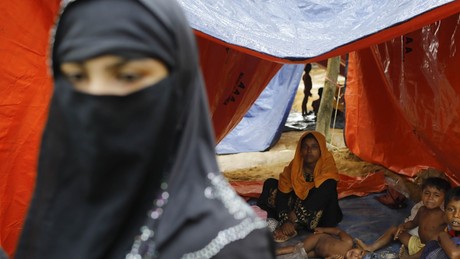Myanmar's Refugee Crisis: Main Players

Violence coursing through western Myanmar has sparked an exodus of hundreds of thousands of stateless Muslim Rohingya, generating international alarm at the blistering animosity fuelling a cycle of bloodshed in the region.
Here are the main players in the spiralling crisis.
The refugeesThe United Nations says some 380,000 Rohingya -- about 60 percent of whom are children -- have fled to Bangladesh since violence broke out in Rakhine state in late August. That's a third of the Rohingya population in Myanmar.
They have arrived in Bangladesh with scant belongings and harrowing tales of attacks from Myanmar's military and Rakhine Buddhists.
It is the latest tragedy for the persecuted Rohingya.
Many of the Muslim minority trace their lineage in Myanmar back generations, but were rendered effectively stateless by the former junta and are demonised among the Buddhist-majority population as illegal immigrants.
The group has been subjected to suffocating restrictions on movement, employment and access to basic services since a previous outbreak of violence in 2012.
That left more than 100,000 trapped in squalid camps near the Rakhine state capital Sittwe.
Nearly 30,000 ethnic Rakhine Buddhists as well as Hindus have also been displaced inside Myanmar in the latest violence.
The Arakan Rohingya Salvation Army (ARSA)Originally calling themselves Harakah al-Yaqin (the Faith Movement), this group burst to prominence in October 2016 with deadly attacks on Myanmar border police.
Bigger attacks on August 25 triggered the latest violence, with the army launching a counter offensive that has left hundreds dead and driven a tide of refugees from their homes.
ARSA is fronted by Ata Ullah, a commander who is believed to have been born to a Rohingya family in Karachi, Pakistan, and to have lived in Saudi Arabia.
Rohingya leaders have long rejected attempts by outside militants to radicalise the population, believing them to be counterproductive.
But observers say oppressive restrictions imposed since the 2012 violence have allowed support for militancy to take root.
The group may only have had several hundred trained militants when it launched its attacks, but local Rohingya men are thought to have taken up crude weapons to join the fight in recent weeks.
Aung San Suu KyiAs the figurehead for Myanmar's civilian leadership, Nobel laureate Suu Kyi has been a lightning rod for international condemnation of the country's response to the crisis.
A flock of fellow Peace Prize winners have decried her for staying silent on the plight of the Rohingya.
Suu Kyi has long faced criticism for failing to champion religious tolerance in Myanmar, where a powerful monk-led Buddhist nationalist movement has fed on seething anti-Muslim sentiment.
Her party shed all its prominent Muslim figures to contest 2015 polls.
Statements from her office attempting to justify the army's assaults have appeared clumsy at best.
But the crisis has also underscored the government's inability to control the military, which retains sweeping powers from its years of junta rule and is not subject to civilian oversight.
The militaryMyanmar army chief Min Aung Hlaing commands one of the region's largest armies, a fighting force that has for decades waged wars within the country's borders against fighters from minority groups.
Myanmar's army, which ruled the country with an iron fist for nearly half a century, has often used scorched-earth tactics against communities it believes are sympathetic to rebel groups.
The military can whip up support among many in the country by presenting its operations as defending local Rakhine Buddhists against what the government has insisted are "extremist terrorists".
But the severity of the latest fighting may further unsettle ethnic armed groups engaged in fragile peace talks.
And the unrest looks to sour international hopes of engaging with the military to entice it into giving up its autocratic habits.
BangladeshThe fresh exodus of Rohingya has generated a humanitarian crisis in Bangladesh, where existing UN-run refugee camps are already packed with Rohingya who fled from previous waves of Myanmar violence.
Dhaka, which has refused to permanently absorb the Rohingya, said it plans to build a huge new camp that will house a quarter of a million refugees.
Prime Minister Sheikh Hasina has called on Myanmar to "stop oppressing innocent people".
International communityUN chief Antonio Guterres has warned the military campaign amounted to ethnic cleansing of the Rohingya.
The UN Security Council on Wednesday called for an end to the violence.
The statement had the backing of China, which has significant economic interests in Rakhine state, despite Beijing's previous comments supporting Myanmar's military crackdown.
As Muslim nations around the world raise alarm over the crisis, Turkey is also planning a meeting of the Organization of the Islamic Conference (OIC).



